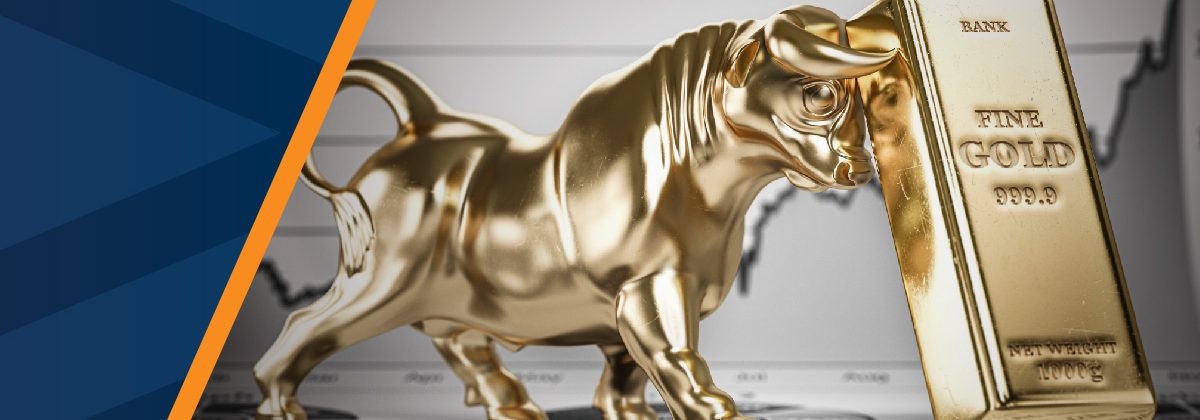Gold has rallied remarkably since March 2024, climbing to newer highs multiple times during the second quarter of the year. The uptrend continued into the third quarter, with gold recording multiple highs since it crossed the $2,500 mark on August 16, 2024. By the end of the first week of September, XAU/USD was up almost 23% YTD. The buoyant gold market and a positive outlook for the shiny metal create diverse opportunities for traders.
What’s Driving the Surge in Gold Prices?
Gold is considered a safe haven. Traders dedicate a portion of their portfolios to the yellow metal to minimise the impact of unprecedented market downturns. However, soaring gold prices have encouraged traders to actively participate and take advantage of tiny price moves using instruments like CFDs. Did you know CFDs allow you to capture price retracements as well?
The factors pushing the yellow metal’s price up are:
Monetary Easing in the US
The world has been eagerly waiting for the Fed to lower interest rates. Gold is negatively correlated with the US dollar, which makes it a popular hedge against risks associated with the greenback. So, gold has been enjoying traction as the markets have been factoring in a decline in the USD since December 2023. The next Fed meeting is scheduled for September 17, 2024, and the Fed is expected to lower key interest rates by at least 25 basis points. This indicates further upside for the shiny metal.
The US Job Openings and Labor Turnover Summary (JOLTS) revealed the lowest number of job openings since January 2021, on September 4. The low July numbers, at 7.7 million, pointed to slower economic growth in the US, raising the prospects of the Fed cutting rates at its September meeting. The increased downside risk around growth commodities, fear of a recession in the US and the possibility of an aggressive monetary easing cycle lent support to the precious metal. As a result, the XAU/USD rose by about 1% by the end of the trading day, following the announcement.
China’s Gold Frenzy
China is the biggest buyer of gold despite its enormous production capacity. The People’s Bank of China (PBoC) drove the gold surge through 2023. The reasons included a fear of increased sanctioning, attempts at de-dollarisation and intensifying geo-political uncertainties after China’s kinship with Russia. The Red Dragon purchased 851 tonnes of gold during H1 2024, 10% higher than the previous year. A 29-tonne increase in net gold purchases in the first half of 2024, took the precious metal to 4.9% of China’s total reserves. The country is back in the market for gold, after a short break in May-June. However, China is expected to take a more tactical approach around gold prices, thanks to the rally, while sustained demand will continue to support the XAU/USD uptrend.
Demand from India
Indian jewellery demand has a significant impact on gold prices. In the July 2024 budget, the Indian government lowered its import duty on the shiny metal to 6%. This has boosted the yellow metal’s demand despite climbing XAU/USD prices. Given the approaching wedding season and major Indian festivals, gold demand will remain strong.
Gold is expected to hold its gains and even add more by the end of the year. XAU/USD outperformed the S&P500 in H1 2024. It is the only asset eclipsing the stellar performance of tech stocks due to steady demand from investors and central banks worldwide.
Interestingly, the gold surge is not a surprise for investors or analysts, which is a positive sign. Traditionally, sudden price rises and declines indicate unsure market sentiment. A steady and sustained gold rally indicates confident bullish support.
If the Fed announces a higher-than-expected rate cut after its next meeting, it could lend further support to gold. In addition, weak economic numbers from China have raised concerns regarding the health of the second largest economy in the world. Amid this sustained rally, Citibank and Bank of America have raised their gold forecasts for 2024-2025 to $3,000 per ounce.
Planning to Capture the Shiny Opportunity?
Entering the precious metals market on a rally may seem difficult for beginners or traders with limited capital. This is where derivative instruments like CFDs come to the rescue, allowing you to explore diverse markets even with limited funds. Plus, you get to speculate on both rising and falling prices without needing to own and store physical gold.
Since CFDs are traded on margin, market exposure can be increased without enormous capital outlay. However, remember that increased exposure translates into higher potential for both profits and losses. Therefore, employing stringent risk management techniques is critical. Use stop loss to avert downside risks when taking a long position and place take profit limits to book gains when riding an uptrend to minimise losses in case the market reverses. You can also hedge your long positions by opening smaller short trades in the opposite direction with CFDs.
Don’t forget to practise on a demo account to familiarise yourself with the XAU/USD market before entering the live markets.
To Sum Up
- Market forces drove gold prices over the $2,500 level in August 2024.
- The surge in gold was driven by rate-cut speculations in the US and high demand from India and China.
- Analysts and traders are bullish on the prospects for gold in Q4 2024 and 2025.
- CFDs lower entry barriers to gold markets.
- Risk management is paramount when trading CFDs.
Disclaimer
All data, information and materials are published and provided “as is” solely for informational purposes only, and is not intended nor should be considered, in any way, as investment advice, recommendations, and/or suggestions for performing any actions with financial instruments. The information and opinions presented do not take into account any particular individual’s investment objectives, financial situation or needs, and hence does not constitute as an advice or a recommendation with respect to any investment product. All investors should seek advice from certified financial advisors based on their unique situation before making any investment decisions in accordance to their personal risk appetite. Blackwell Global endeavours to ensure that the information provided is complete and correct, but make no representation as to the actuality, accuracy or completeness of the information. Information, data and opinions may change without notice and Blackwell Global is not obliged to update on the changes. The opinions and views expressed are solely those of the authors and analysts and do not necessarily represent that of Blackwell Global or its management, shareholders, and affiliates. Any projections or views of the market provided may not prove to be accurate. Past performance is not necessarily an indicative of future performance. Blackwell Global assumes no liability for any loss arising directly or indirectly from use of or reliance on such information here in contained. Reproduction of this information, in whole or in part, is not permitted.





